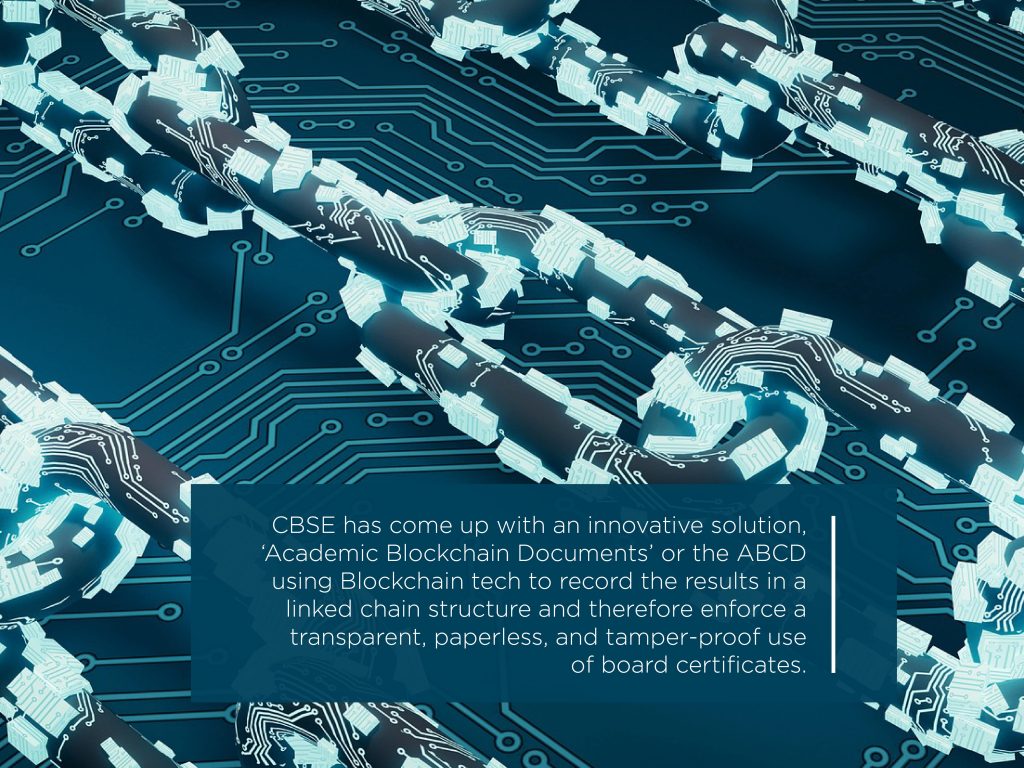A few years ago, blockchain, the public distributed ledger technology, was merely limited to cryptocurrency but with time and tide, it is extending its reach to nearly every sector of the economy. Education being one of the prominent ones has many potential advantages coming along the Web 3.0. The national board CBSE, using it for board result documents as Academic BlockChain Documents has officially started the Blockchain functioning in the pedagogy sector. Indeed this is just the antecedent, there is much more to come.
CBSE has always been a step forward in maneuvering various IT initiatives peculiarly in the examination domain. Following the same traction, CBSE has come up with an innovative solution, ‘Academic BlockChain Documents’ or the ABCD using Blockchain tech to record the results in a linked chain structure and therefore enforce a transparent, paperless, and tamper-proof use of board certificates.
CBSE and its ABCD initiative

CBSE is not just known for its well-structured comprehensive curriculum followed by the Best CBSE Schools in Visakhapatnam and other schools but is also known for the lead in employing pioneering IT systems implemented for stakeholders and functions of the board. Academic {Blockchain} Documents have been established using Web 3.0 to record CBSE academic documents by associating them like a chain. The ABCD chain records academic documents in the distributed ledger by the inclusion of all participating nodes. Any data recorded in Blockchain is based on consensus among nodes and is recorded and updated simultaneously at all locations in the distributed networks. Because of this reason, there is no need for verification by third parties. Along the same lines, the data are linked and stored with cryptographic security so that they are immutable and traceable.
CBSE has collaborated with the Centre of Excellence for Blockchain Technology of the National Informatics Centre that falls under the Ministry of Electronics and Information Technology (MeitY) to roll out the Academic BlockChain Documents software. Presently the nodes are established at Bengaluru, Pune, and Jaipur, and the certificate chain system is managed by NIC at its data centers. Previously CBSE was using the DigiLocker to authenticate and provide certificates to students for board results.
How is it beneficial?
One of the major challenges CBSE faces is the verification and authentication of certificates produced for admissions, loans, jobs, etc. To process the genuineness of these certificates needs considerable processing time and effort. This is the reason why most organizations ask to present the original certificate while applying for higher studies, jobs, and loans. The ABCD software addresses this problem as the distributed ledger records data with the ownership of all stakeholders that can be verified without any hassle.
The system can be used by various organizations and educational institutions for job offers or higher education. The same can be helpful to authenticate the documents needed for loans since the system is tamper-proof, transparent, and has no dependency.
How can the documents be verified?
- The documents can be verified using the ABCD portal and entering the basic information to view the academic records like roll number.
- The educational institutions can get themselves registered with CBSE to utilize the bulk verification tool and API-based verification.
For now, the academic documents for the years 2019, 2020, 2021 for classes X and XII are in the ABCD system and gradually CBSE will concatenate the previous years’ documents too.
About CBSE Board
CBSE is the national board of our country and because of this fact, it has the biggest advantage of being conducive to the pattern in our country. The syllabus is in proper sync with the major competitive examinations such as IIT, AIEEE & NEET. The board focuses more on Mathematics and Science along with the round development of a child’s personality and intellect. The board’s education also takes charge of laying the foundation for the cultural growth of a child. It has a pan India presence with around 24,000 schools in India including the Best CBSE Schools in Nagpur.
Blockchain has just begun settling in the education tract and with CBSE using it for the board, certificates have kindled their way. Blockchain is yet to revolutionize the education sector and with its potential use as maintenance of student records, information storage, course evaluation, digital examination, and more, the best of decentralized tech in education is yet to come.
